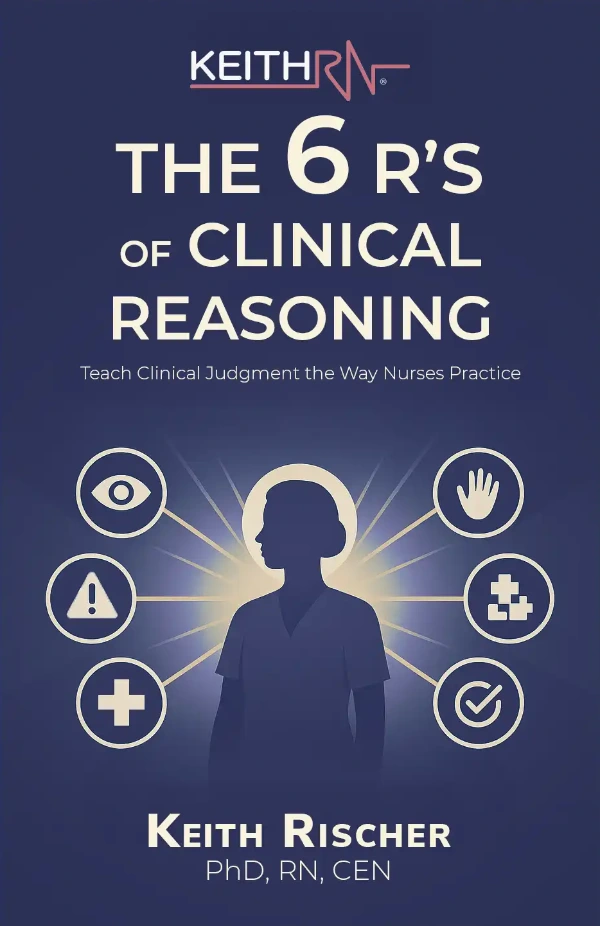
When you hear the word curriculum, what is the first thing that comes to mind? For some educators it is a dirty word as it conjures up unpleasant feelings of endless meetings and the ongoing work that goes with curriculum revision.
I too had some assumptions about curriculum before I took my graduate class this semester on Advanced Curriculum Assessment and Evaluation.
I was pleasantly surprised by the numerous practical takeaways I learned that I believe can help any educator take a different look at the curriculum to bring about needed transformational change in your program.
Curriculum Defined
Would it surprise you to know that the essence of the meaning of curriculum is the knowledge that is passed from one generation ot the next and consists of courses that lead to a degree (Iwasiw & Goldenberg, 2015)?
As it relates to nursing, what do you think is the knowledge foundational to professional practice that must be clearly communicated to the next generation of nurses?
From my perspective, a short list would include the importance of the applied sciences (A&P, F&E, pharmacology), development of clinical judgment, and ethical/professional behavior.
Values to Pass On
In addition to knowledge that must be taught to the next generation of nurses, equally important are the values of the nursing profession that make nursing practice distinct from medical practice.
Living in a post-modern culture, where absolute truth is rejected and all values are considered relative, nurse educators need to identify the values that nursing embodies that are non-negotiable and central to our professional identity.
Values such as caring, compassion, and service to others to provide holistic care.
For example, many programs emphasize the importance of caring and compassion in their mission statements as desirable outcomes for graduates, but I have taught in programs where students were expected to provide “compassionate care”, yet it was not integrated or made intentional in the curriculum in any tangible way.
If nursing curriculum does not pass on these values that have historically been a part of our professional identity for over two thousand years, nursing is in danger of losing the centrality of these values in one generation.
Foundational Curriculum Themes
Curriculum can be divisive and separates some educators like Democrats and Republicans. Do you favor a concept-based curriculum or do you think a traditional systems curriculum is best?
Instead of focusing on differences, taking this curriculum course got the wheels spinning and helped me identify universal principles that the curriculum in every nursing program needs to embrace regardless of the formal curriculum structure utilized.
Here are some examples of key big-picture components of the curriculum relevant for all nursing programs. See if your program aligns with these principles to better prepare your students for professional practice!
Purpose/Vision of Curriculum
- Ensure that every student has developed competent levels of clinical judgment required for safe clinical practice and licensure.
- Ensure that every student will have the tools to mitigate reality shock and transition successfully to clinical practice.
Values/Beliefs of Curriculum
- Every person has inherent value and worth.
- Mutual respect towards both students and faculty. This will be demonstrated by seeking to find common ground
- Role of nursing…provide holistic care
- The patient is central. Everything that is done by the nurse is to improve quality of care and improve patient outcomes.
- Both faculty and students commit to lifelong learning and embrace excellence in academic/nursing practice.
- No student will rise to low expectations. Have a high but realistic bar of student expectations.
- Faculty need to maintain currency in autonomous nursing practice to remain relevant and effectively integrate current practices into all aspects of the program. How can the curriculum remain current if faculty are not current in clinical practice?
- The program/curriculum may be good, but it can always be better. Embrace the need for change so you never stop improving!
Essential Concepts of Curriculum
- Caring, compassion, and serving with integrity is the essence of professional nursing practice.
- Student-Centered Learning. Learning is a partnership. learners in the learning process are a priority, not the faculty member. The environment of learning needs to be safe and students must feel supported in their learning efforts.
- Students assume responsibility for learning and will be expected to come to the classroom prepared, ready to engage with the content to be taught.
- Faculty will use active learning that emphasizes knowledge usage and application.
- Faculty will embrace change that represents educational best-practice. Faculty commit to being open to new ideas, and do what is needed to incorporate educational excellence in academic practice.
Theoretical Frameworks
Did you know that caring and engagement of the nurse influences the clinical judgment of nurses (Tanner, 2006)?
Therefore, a caring theory framework such as Swanson’s Middle Range Theory of Caring and Tanner’s Model of Clinical Judgment are essential frameworks for your curriculm to help develop the nurse thinking most graduates are currently lacking.
Be sure to click the links to learn more about these foundational nursing theories that should be a part of your curriculum as well!
- Tanner’s Model of Clinical Judgment
- Watson’s Science of Human Caring
- Swanson’s Middle Range Theory of Caring
Action Steps
- Make your own personal list of essential KNOWLEDGE. Make sure that your graduates know and understand what’s most important based on the content you teach so they are well prepared for practice.
- Make your own personal list of the essential VALUES your graduates must embody. Evaluate your content and your program’s curriculum to determine if these values are emphasized and integrated intentionally in your course and curriculum.
- Reflect and evaluate your courses/curriculum with universal themes. What is currently a strength? What is lacking? Make it a priority to make any weakness a strength before the end of the school year!
In Closing
Embrace the responsibility to be a communicator of essential knowledge and values to the next generation of nurses!
Though the overall structure of curriculum may differ, the overarching vision, essential values, concepts, and theoretical frameworks that include’s Tanner’s Model of Clinical Judgment ought to be consistent and universal throughout nursing education.
Identify the weaknesses and strengths in your curriculum and do what is needed to implement needed change so you authentically communicate the knowledge and values of professional nursing to this generation, so they continue to live on long after you are gone!
Related Blogs
- Teaching Caring
- Five Character Traits Every Nurse (and student!) Need to Possess
- The ONE THING that Every Student Must Know About Patho
References
Iwasiw, C., & Goldenberg, D. (2015). Curriculum development in nursing education (3rd ed.). Burlington, MA: Jones & Bartlett Learning.
Tanner, C. A. (2006). Thinking like a nurse: A research-based model of clinical judgment in nursing. Journal of Nursing Education, 45(6), 204–211.
Related YouTube!
Keith Rischer – PhD, RN, CEN
As a nurse with over 35 years of experience who remained in practice as an educator, I’ve witnessed the gap between how nursing is taught and how it is practiced, and I decided to do something about it! Read more…
The Ultimate Solution to Develop Clinical Judgment Skills
KeithRN’s Think Like a Nurse Membership
Access exclusive active learning resources for faculty and students, including KeithRN Case Studies, making it your go-to resource.

Teach How Nurses Practice
Get the 6 R’s of Clinical Reasoning, a practice-based teaching framework based on Tanner’s CJM to help students recognize risks and prevent failure to rescue.
Keith Rischer – PhD, RN, CEN
As a nurse with over 35 years of experience who remained in practice as an educator, I’ve witnessed the gap between how nursing is taught and how it is practiced, and I decided to do something about it! Read more…
The Ultimate Solution to Develop Clinical Judgment Skills
KeithRN’s Think Like a Nurse Membership
Access exclusive active learning resources for faculty and students, including KeithRN Case Studies, making it your go-to resource.




